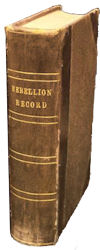—A mass meeting of leading members of the Baptist Church was held at Brooklyn, N. Y., for the purpose of giving formal expression to their feelings, as a religious community in the present crisis, and to record their attachment to the Union, and their determination to uphold the efforts of the Federal Government, in behalf of the Constitution.—(Doc. 211.)
—The Brooklyn, Capt. Poore, entered the Mississippi River, below New Orleans, and sent out a number of boats, strongly manned with armed men, to board the ships lying on the bar, to acquaint them of the terms of the blockade. After some discussion, it was agreed that the ships on the bar should have fourteen days to go out. Capt. Poore also made a full survey and soundings of the river.—N. O. Delta, May 31.
—A statement of the Geographical arrangements of the army of the United States, corrected to date, is published.—(Doc. 212.)
—President Davis reached Richmond this morning, accompanied by his nephew, Mr. Joseph Davis, Col. Northrop, of the Confederate Army, and Col. Wigfall. Gov. Letcher and the Executive Council met and received the President at Petersburg. An immense assemblage welcomed his arrival at Richmond, with the most enthusiastic demonstrations of delight. The President, in a brief address, thanked the multitude for the hearty reception given him.—N. O. Delta, May 30.
—To-day the American flag was raised over the late residence of Lieutenant-General Scott, at Elizabethtown, N. J., in the presence of about five thousand people. When the flag was given to the breeze, the “Star-Spangled Banner” was sung, the vast concourse of people joining the chorus, producing a fine effect. Mayor Burnett presided, and speeches were made by William F. Day and Rev. Hobart Chetwood, which were received with great applause.—N. Y. Commercial, May 30.
—The correspondence in relation to the establishment of a department of nurses, and the acceptance of the services of Miss Dix, by the Secretary of War, is published.—(Doc. 213.)
—The New Orleans True Delta of this day contains the following:—”We have again and again received information of the motions and sentiments of vagabond free persons of color, upon whom it would be well that the police should keep an eye. These men are without ostensible means of earning a livelihood, and are, by many degrees, too familiar with our slave population, instilling into their minds sanguine notions of the ‘good time’ to be experienced in the event of Lincoln’s hoped-for success over the Southern people. The lake end of the Pontchartrain Railroad is infested with persons of this character, who exhibit a remarkable shrewdness in broaching their pestiferous hints and suggestions. The city also affords rendezvous, at which there are gathered knots of these vagabonds at unseasonable hours. Of course the localities are selected with a view to privacy and remoteness from the inquisitive eyes of the watchman. Careful espionage may bring to light the object of these nocturnal consultations.”
—The Twentieth, Twenty-first, and Twenty-fourth Regiments of Pennsylvania militia left Philadelphia for Chambersburg.—N. Y. Commercial, May 30.
—Colonel Mann’s Regiment of Pennsylvania militia, arrived at Easton, Pa., and went into camp.—(Doc. 214.)
—The American citizens in Paris favorable to the Union breakfasted together in the Hotel du Louvre. About one hundred and fifty attended, of whom one-third were ladies, including the wife of General Scott. Mr. Cowdin presided. Resolutions were adopted, pledging the meeting to maintain the Union under any circumstances. Mr. Dayton, the U. S. Minister, said that, since his arrival in France, be could detect no unfriendly feeling on the part of France to the United States, and certainly no French citizen would be found among the privateersmen. He expressed the conviction that the rebellion would be put down. Cassius M. Clay spoke at length, and was emphatic in his comments on the conduct of England in recognizing Southern belligerent rights. He declared that if ever the flag of England was associated with the black flag of the South, the Star-Spangled Banner of the United States and the tricolor of France would be seen together against her, for France had not forgotten St. Helena. Hon. Anson Burlingame spoke on the same topic. Col. Fremont was next called upon, and was received with enthusiasm. He made a quiet and moderate speech. He regretted the fanatical war, and felt confident it would end in the triumph of truth and justice. He had been called back to America, and would lose no time in responding. He was ready to give his best services to his country. Rev. Dr. McClintock followed. He said he did not attach any importance to the mutterings of the English press. The people of England had not yet spoken, and when they did speak, their voices would not be found on the side of piracy and slavery. Capt. Simons, of the U. S. Army, said he was on his way home, in obedience to the summons of Gen. Scott. Mr. Haldeman, Minister to Vienna, and Rev. Mr. Thayer, also spoke. All the speakers evinced not the slightest doubt of the final triumph of the North.— Galignani’s Messenger, May 30.
—The London News, of this date, contains a remarkable article on the “War in America.” —(Doc. 214½.)



